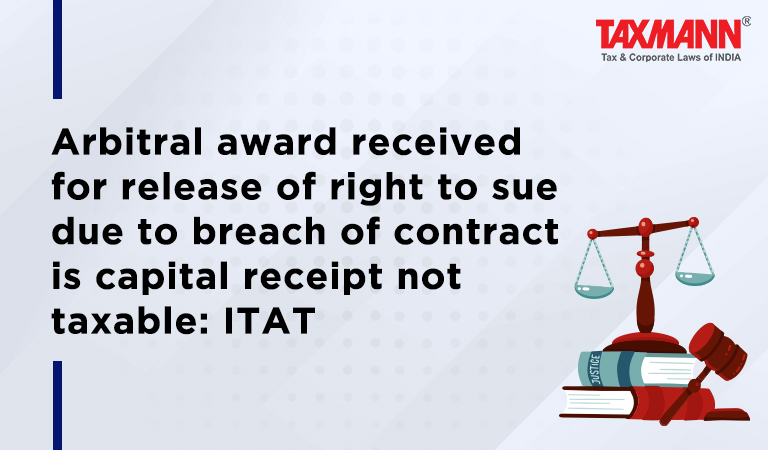Arbitral award received for release of right to sue due to breach of contract is capital receipt not taxable: ITAT
- Blog|News|Income Tax|
- 3 Min Read
- By Taxmann
- |
- Last Updated on 9 March, 2022

Case Details: ITO v. Ganeshsagar Infrastructure (P.) Ltd. - [2022] 135 taxmann.com 313 (Ahmedabad - Trib.)
Judiciary and Counsel Details
-
- Rajpal Yadav, Vice President and Pradip Kumar Kedia, Accountant Member
- Virendra Ojha, CIT. D.R. for the Appellant.
- Dhiren Shah and Ms. Nupur Shah, A.Rs. for the Respondent.
Facts of the Case
Assessee entered into registered agreements to purchase certain agricultural land parcels with original landowners. The assessee paid various amounts to the original landowners as agreed. Later, assessee found that the original landowners had also sold land parcels in question to family members.
Original landowners, purchasers and assessee went through various levels of litigations to claim rightful ownership of land parcels. Later, the assessee and original purchasers referred the matter for arbitration to resolve the disputes regarding rightful ownership outside the Court.
The original purchasers sold the disputed land, and out of such sale proceeds, a sum of Rs. 70 crores were apportioned to the assessee in consonance with the arbitration award. During assessment proceedings, Assessing Officer (AO) held that compensation for relinquishment for the right to sue is chargeable to tax as capital gains. On appeal, CIT(A) reverse the order of AO. AO filed the instant appeal before the Tribunal.
ITAT Held
The Tribunal held that the rights of the assessee arising under the sale agreement with the original landowners were frustrated in view of another sale agreement of the same land parcels in favour of the other party. The assessee received certain consideration by way of damages as a culmination of ongoing vexatious dispute towards rightful ownership of land parcels in question.
However, the proceedings on the challenge for rightful owner of land before the Court of law continued and had not come to an end. As a result, the right of the assessee to sue the defaulting party was open and subsisting.
The compensation received was an off-shoot of the right to sue, an untransferrable right in personam of capital nature. The plea on behalf of the revenue that the assessee had nearly exhausted its right to sue has to be seen from the litigant’s point of view.
Thus, these receipts towards compensation do not fall within the sweep of expression ‘property of any kind’ notwithstanding its very wide connotations. Merely because a right towards compensation surfaced as a result of the sale of disputed land would not per se govern its taxability unless such right can be termed a ‘capital asset’.
Case Review I
-
- Bhojison Infrastructure (P.) Ltd. v. ITO [2018] 99 taxmann.com 26/173 ITD 436 (Ahd. );
- CIT v. J. Dalmiya [1985] 20 Taxman 86/[1984] 149 ITR 215 (Delhi);
- Baroda Cements & Chemicals Ltd. v. CIT [1986] 25 Taxman 324/158 ITR 636 (Guj.) and
- CIT v. Abbasbhoy A. Dehgamwalla [1991] 59 Taxman 498/[1992] 195 ITR 28 (Bom.) (para 16.4) followed.
Case Review II
-
- Shree Cement Ltd. v. Addl. CIT [2014] 49 taxmann.com 274/[2015] 152 ITD 561 (JP. – Trib.);
- ACIT v. L H. Sugar Factory Ltd. [IT Appeal Nos. 417, 418 & 339 (LKW) of 2013, dated 9-2-2016] and
- Dy. CIT v. Binani Industries Ltd. [2017] 82 taxmann.com 320 (Kol. – Trib.) (para 21.3) followed.
List of Cases Referred to
-
- CIT v. B.C. Srinivasa Setty [1981] 5 Taxman 1/128 ITR 294 (SC) (para 15)
- CIT v. J. Dalmiya [1985] 20 Taxman 86/[1984] 149 ITR 215 (Delhi) (para 16.4)
- Baroda Cements & Chemicals Ltd. v. CIT [1986] 25 Taxman 324/158 ITR 636 (Guj.) (para 16.4)
- CIT v. Abbasbhoy A. Dehgamwalla [1991] 59 Taxman 498/[1992] 195 ITR 28 (Bom.) (para 16.4)
- Bhojison Infrastructure (P.) Ltd. v. ITO [2018] 99 taxmann.com 26/173 ITD 436 (Ahd. – Trib.) (para 16.5)
- ACIT v. Shree Cement Ltd. [IT Appeal Nos. 614, 615 & 635 (JP) of 2010, dated 9-9-2011] (para 21.3)
- ACIT v. L. H. Sugar Factory Ltd. [IT Appeal Nos. 417, 418 & 339 (LKW) of 2013, dated 9-2-2016] (para 21.3)
- Dy. CIT v. Binani Industries Ltd. [2017] 82 taxmann.com 320 (Kol. – Trib.) (para 21.3).
Disclaimer: The content/information published on the website is only for general information of the user and shall not be construed as legal advice. While the Taxmann has exercised reasonable efforts to ensure the veracity of information/content published, Taxmann shall be under no liability in any manner whatsoever for incorrect information, if any.

Taxmann Publications has a dedicated in-house Research & Editorial Team. This team consists of a team of Chartered Accountants, Company Secretaries, and Lawyers. This team works under the guidance and supervision of editor-in-chief Mr Rakesh Bhargava.
The Research and Editorial Team is responsible for developing reliable and accurate content for the readers. The team follows the six-sigma approach to achieve the benchmark of zero error in its publications and research platforms. The team ensures that the following publication guidelines are thoroughly followed while developing the content:
- The statutory material is obtained only from the authorized and reliable sources
- All the latest developments in the judicial and legislative fields are covered
- Prepare the analytical write-ups on current, controversial, and important issues to help the readers to understand the concept and its implications
- Every content published by Taxmann is complete, accurate and lucid
- All evidence-based statements are supported with proper reference to Section, Circular No., Notification No. or citations
- The golden rules of grammar, style and consistency are thoroughly followed
- Font and size that’s easy to read and remain consistent across all imprint and digital publications are applied



 CA | CS | CMA
CA | CS | CMA
